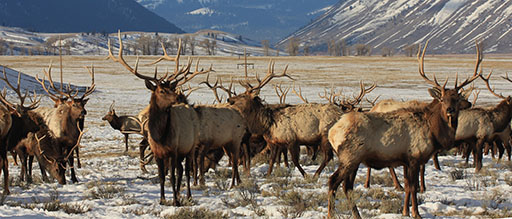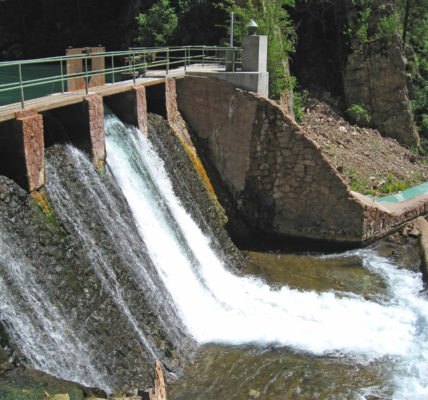By Mike Koshmrl
Jackson Hole Daily
Via- Wyoming News Exchange
JACKSON — Teton County elected officials are backpedaling on urging wildlife managers to start weaning elk off of artificial feeding, a step one county commissioner said was prudent to avert the worst consequences of recently discovered chronic wasting disease.
The request to do something sooner rather than later was expressed in a draft letter that commissioners were going to send to the Wyoming Game and Fish Department. Elected officials also mentioned giving private landowners incentives to tolerate elk that might disperse from historic feed lots.
But while meeting Monday, two commissioners described taking those positions as being “out over our skis.” So now the board is softening its tone and delaying recommendations regarding the historic and controversial practice.
“The current draft just says, ‘Hey, we want to be a part of the process,’” Commissioner Mark Newcomb, the primary author of the original letter, said Thursday.
But when they met Monday, several commissioners appeared uneasy about weighing in substantively on artificially concentrating elk with supplemental feeding in the era of CWD — an always-lethal and degenerative neurological disease that has no cure.
“I kind of feel like we’re in a little bit of a damage-control scenario and we’ve gotten ahead of ourselves,” Commissioner Greg Epstein said.
Commissioner Mark Barron had concerns about “getting out of our lane on a scientific opinion” that commissioners had “no business in,” and Chairwoman Natalia Macker also supported dialing back the county’s request.
“My general feeling is there’s more detail in here than I am comfortable sending in a letter, without having a more robust discussion with our community,” Macker said.
The more bare-bones letter that Teton County is looking to send the state now is not a sure thing, though Newcomb mentioned he has a “fairly high level of confidence” that the county will engage with the state. It’s set to be discussed again this coming Monday.
Game and Fish’s public review of elk feeding is multi-tiered. At this juncture, the state is seeking comments primarily to determine what the next phase will look like. Friday brings one deadline (see WGFD.wyo.gov/Get-
“People can comment beyond Jan. 8, and we’re always going to consider it,” Gocke said. “There’s going to be plenty of opportunities for people to weigh in on what should be done with feedgrounds.”
The planning process will culminate in an elk feedground management plan. In the “long term,” anything is on the table, even closing feedgrounds, Game and Fish Regional Supervisor Brad Hovinga told commissioners Monday.
But in the “short or midterm,” the agency will stick with the status quo — feeding about 15,000 elk on its 22 feedgrounds, according to Game and Fish Director Brian Nesvik.
Those time frames don’t really have assigned definitions, Hovinga said.
“Mid-term is probably in the next five to 10 years, that’s my opinion,” he said. “Long-term is going to be 10 years and beyond.”
The Jackson Elk Herd could change significantly before that.
The only peer-reviewed effort to model the effect of CWD within the Jackson Herd predicted that prevalence would reach 10% within five years of the prion disease’s arrival.
The first case was confirmed in December. At just a 7% rate of infection, the research found, the elk will die faster than they can replace themselves, even in the absence of cow elk hunting.
The two members of the public who spoke Monday both encouraged commissioners to weigh in.
“The recent confirmation of chronic wasting disease in National Elk Refuge elk could have devastating impacts on our elk herds,” Eco Tour Adventures wildlife guide Josh Metten said. “As a tour operator, which benefits economically from the Jackson Elk Herd, we support the development of innovative policy and tools to address disease issues, maintain a robust health population and address impacts to private landowners and agricultural operations.”
Chris Colligan, of the Greater Yellowstone Coalition, made the case that CWD and elk feeding is very much the county commission’s business.
“There’s a lot of uncertainty about the human threats,” Colligan said. “Chronic wasting disease prions have been detected in municipal water supplies, they’ve been detected in agricultural plant commodities, and the CDC recommends that we don’t consume CWD-infected animals.
“This is a big concern for health and human safety,” he said, “as well as for the county’s operation of the trash transfer station and disposal of CWD-infected carcasses.”






